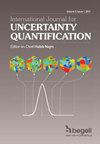Structure-Preserving Model Order Reduction of Random Parametric Linear Systems via Regression
IF 1.8
4区 工程技术
Q2 ENGINEERING, MULTIDISCIPLINARY
International Journal for Uncertainty Quantification
Pub Date : 2024-04-01
DOI:10.1615/int.j.uncertaintyquantification.2024048898
引用次数: 0
Abstract
We investigate model order reduction (MOR) of random parametric linear systems via the regression method. By sampling the random parameters containing in the coefficient matrices of the systems via Latin hypercube method, the iterative rational Krylov algorithm (IRKA) is used to generate sample reduced models corresponding to the sample data. We assemble the resulting reduced models by interpolating the coefficient matrices of reduced sample models with the regression technique, where the generalized polynomial chaos (gPC) are adopted to characterize the random dependence coming from the original systems. Noting the invariance of the transfer function with respect to restricted equivalence transformations, the regression method is conducted based on the controllable canonical form of reduced sample models in such a way to improve the accuracy of reduced models greatly. We also provide a posteriori error bound for the projection reduction method in the stochastic setting. We showcase the efficiency of the proposed approach by two large-scale systems along with random parameters: a synthetic model and a mass-spring-damper system.通过回归减少随机参数线性系统的结构保持模型阶次
我们通过回归方法研究了随机参数线性系统的模型阶次还原(MOR)。通过拉丁超立方法对包含在系统系数矩阵中的随机参数进行采样,利用迭代有理克雷洛夫算法(IRKA)生成与样本数据相对应的样本还原模型。我们利用回归技术对还原样本模型的系数矩阵进行插值,从而组装出还原模型,其中采用广义多项式混沌(gPC)来表征来自原始系统的随机依赖性。注意到传递函数在受限等价变换方面的不变性,回归方法基于还原样本模型的可控规范形式,从而大大提高了还原模型的精度。我们还为随机环境下的投影还原法提供了后验误差约束。我们通过两个具有随机参数的大型系统:合成模型和质量弹簧-阻尼系统,展示了所提方法的效率。
本文章由计算机程序翻译,如有差异,请以英文原文为准。
求助全文
约1分钟内获得全文
求助全文
来源期刊

International Journal for Uncertainty Quantification
ENGINEERING, MULTIDISCIPLINARY-MATHEMATICS, INTERDISCIPLINARY APPLICATIONS
CiteScore
3.60
自引率
5.90%
发文量
28
期刊介绍:
The International Journal for Uncertainty Quantification disseminates information of permanent interest in the areas of analysis, modeling, design and control of complex systems in the presence of uncertainty. The journal seeks to emphasize methods that cross stochastic analysis, statistical modeling and scientific computing. Systems of interest are governed by differential equations possibly with multiscale features. Topics of particular interest include representation of uncertainty, propagation of uncertainty across scales, resolving the curse of dimensionality, long-time integration for stochastic PDEs, data-driven approaches for constructing stochastic models, validation, verification and uncertainty quantification for predictive computational science, and visualization of uncertainty in high-dimensional spaces. Bayesian computation and machine learning techniques are also of interest for example in the context of stochastic multiscale systems, for model selection/classification, and decision making. Reports addressing the dynamic coupling of modern experiments and modeling approaches towards predictive science are particularly encouraged. Applications of uncertainty quantification in all areas of physical and biological sciences are appropriate.
 求助内容:
求助内容: 应助结果提醒方式:
应助结果提醒方式:


